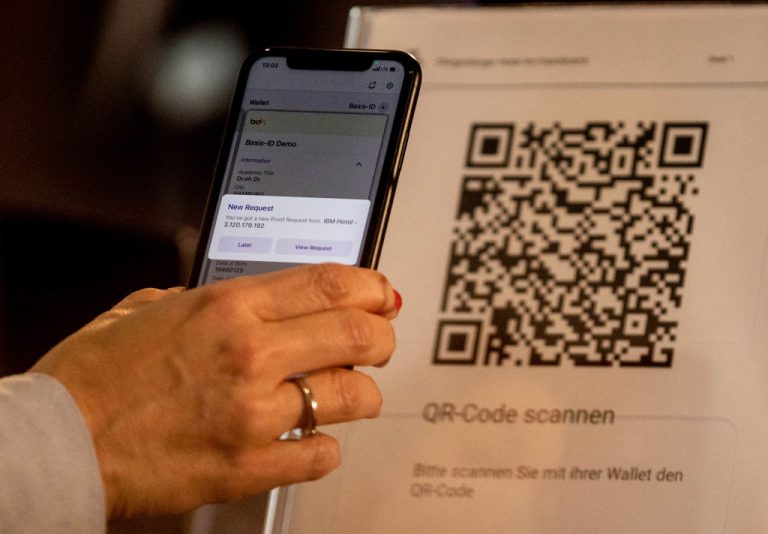One of the fundamental underpinning elements of a social credit system, digital identification, has been promoted in a new white paper published by a digital ID non-profit in conjunction with several of Canada’s most influential corporations.
Published in May by the Digital Identity Laboratory (DIL), the 27-page document is titled Peace Of Mind In The Digital Age? It’s Possible! and features an image of a smiling Asian woman on its cover.
MORE ON DIGITAL ID AND SOCIAL CREDIT
- Understanding Alberta and Ontario Digital ID Systems
- In Canada, Implementation of Digital ID Lays Foundations for China-style Social Credit System
- The Case Against the ‘15-minute City’
- Implantable Microchips Are Here to Stay Whether You ‘Like It or Not’
- Greece Moves Towards Social Credit as Digital ID App Replaces Drivers Licenses
In its Foreword, the paper states it is “result of the collaborative efforts” between the DIL and “endorser organizations,” which include:
- Credit union and insurance group Desjardins
- Professional services and analytics firm KPMG
- Insurance firm Beneva
- Quebec-serving internet service provider Videotron
- National ISP and cellular provider Telus
In its Summary, the document says “Digital ID is a necessary evolution for society” on the basis that, “Most countries are moving toward digital ID. It will be implemented in tandem with governments, businesses and the public.”
The paper lauds a 2019 study by management and consulting firm McKinsey that claimed “implementing a digital ID process” would serve a benefit to countries by increasing their GDP by 3 to 13 percent.
Success
You are now signed up for our newsletter
Success
Check your email to complete sign up
Both McKinsey and KPMG prominently feature Environmental, Social, and Governance (ESG) on the front page of their websites as of time of writing, which many say is a repackaged version of the Chinese Communist Party’s corporate social credit system.
The DIL’s paper claims that despite widespread hacking and phishing campaigns being prevalent on the Internet, digital technologies we already use being riddled with “inherent risks,” and concerns over vaccine passport and contact tracing-era social control systems, “We quickly note that the current state carries far more risk.”
“The lack of an official digital ID further exposes people and organizations to fraud, identity theft, and other forms of cybercrime,“ the DIL claims.
The paper continues, “We must educate people and raise awareness about digital citizenship in order to garner broad support for digital ID.”
In its essence, the white paper seeks to employ a central wallet application that will house a person’s digital identification, which they will rely on for completing basic services such as renting a car and applying for a job.
In an infographic on applying for a job, the paper uses a new graduate named “Taylor” as an example where she has to use her digital identification to provide proof of her degree when applying.
After being hired, instead of filling out the usual paperwork to register her name, date of birth, mailing address, and provide her bank account with her employer, she relies on her digital ID wallet app instead.
A similar process is used by Taylor during an example on opening a new bank account, applying for a mortgage, and buying plane tickets.
The paper also includes a section called The Fight Against Fraud focuses on how Canada’s Social Insurance Number system will be transformed into part of the digital wallet, “In short, our verifiable social insurance credential will be cryptographic proof of our current social insurance number that Service Canada will create.”
The DIL thus claims, “Digital ID renders stealing personal information unappealing and no longer financially rewarding to fraudsters.”
One of the largest concerns with such systems is that they mirror the CCP’s Orwellian Internet censorship control system, where a digital national ID must be linked with a personal cellular phone in order to create even the most basic of accounts online.
A 2020 CNET article, for example, stated that the regime pushed new edicts requiring ID to be provided that “apply to everyone buying a phone or SIM (subscriber identity module) card, including foreigners and short-term visitors.”
“The requirement was adopted to curb rampant spam, porn, and telecom fraud,” the piece stated, relying on statements made by state media outlet Xinhua.
“But the move also will give the government, already criticized for stomping out free speech by human rights groups, even greater ability to monitor the citizens and their communications,” CNET stated.
The article recounted the anecdote of a man who told another Party media outlet, Global Times, that after registering his national ID with his phone number he immediately received spam from “insurance and property companies who identified my name, age and working unit on the phone.”
The DLI’s white paper concludes, “We need to take the time to educate the public, introduce digital ID, show how it will fit into our day-to-day lives and how it will make it easier for us to access public services or businesses.”
Several “winning conditions” are further described by the DIL in its battle to install digital ID.
The three major ones, they state, are:
- “Implementing robust and effective governance in the form of legislation, policies, regulations, roles, responsibilities and processes within digital ID ecosystems”
- “Buy-in and support from public and private sector organizations” and
- “Adhering to operating principles that put people at the centre of the system based on the pillars of Agency, Autonomy and Integrity.”


















